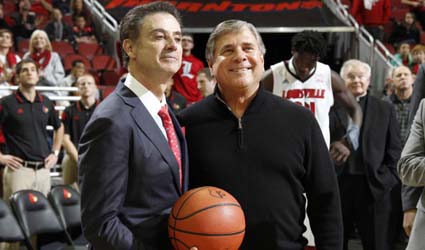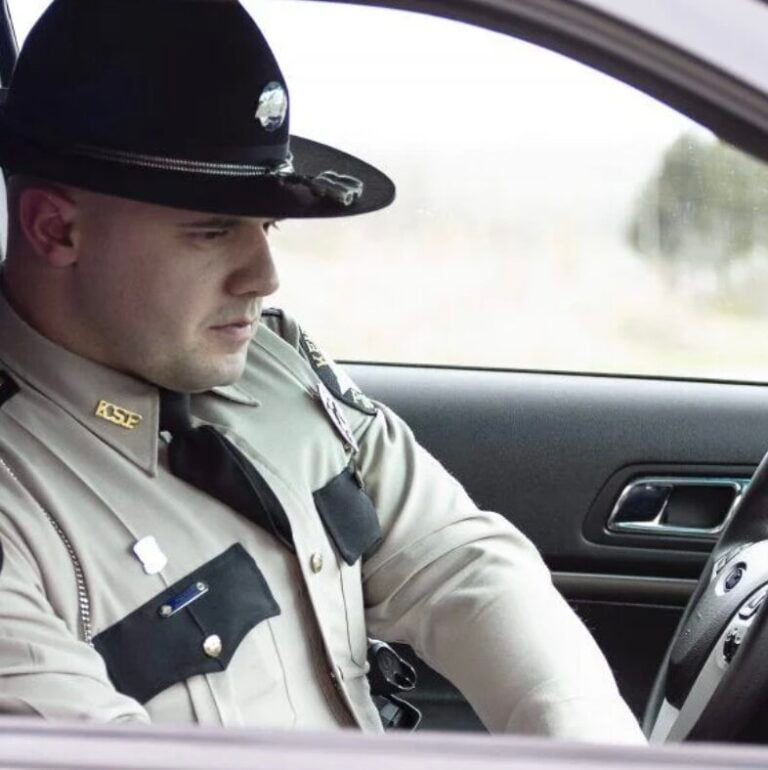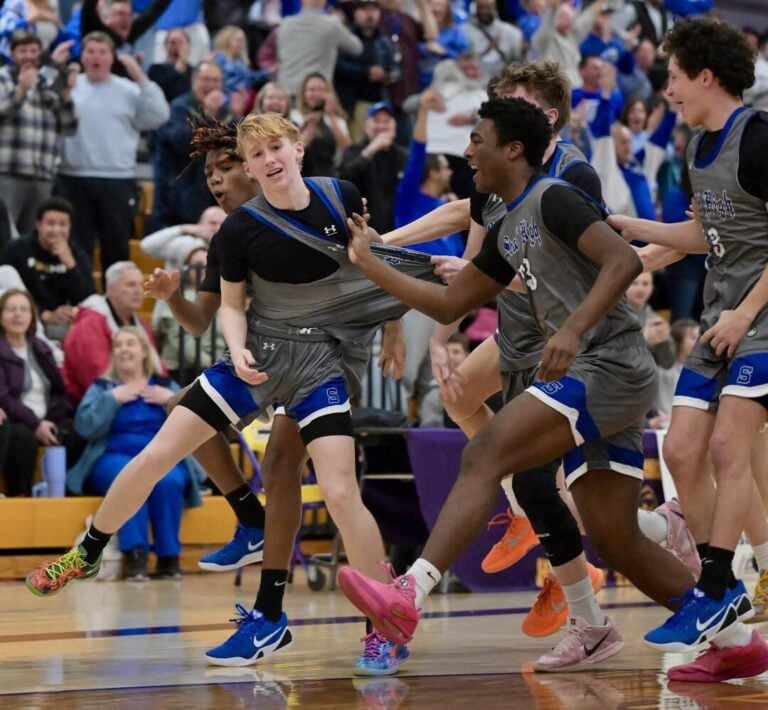If you like lurid sex mysteries, you don’t have to visit your local movie theater or go surfing through Netflix. All you have to do is turn on almost any sports radio talk show in Louisville to hear about the bizarre story unfolding in coach Rick Pitino’s basketball program.
The bombshell exploded late last Friday afternoon, when word got out that a self-admitted prostitute, Katina Powell, was coming out with a book in which she claimed to have orchestrated 22 “sex parties” for U of L players and recruits from 2010-14.
She claimed the parties were bankrolled by Andre McGee, a former Cardinal player and Pitino’s Director of Operations until he left in 2014 to take an assistant’s job at Missouri-Kansas City. Furthermore, claimed Powell, many of the events happened in Billy Minardi Hall, the on-campus players’ dorm named after Pitino’s late brother-in-law, who was killed in the 9/11 tragedy.
In a hastily called press conference, U of L athletics director Tom Jurich and Pitino both said they knew nothing about Powell’s claims until late August, when a member of the Indiana University athletics staff called his U of L counterpart to tell him that a deep-pockets IU booster needed some help in verifying the identity of a U of L player in a photograph that would go into a book.
This is where the plot really begins to thicken.

The IU booster was Mickey Maurer, whose name adorns the library on the Bloomington campus. His holdings also include the Indianapolis Business Journal, which owns a book-publishing subsidiary that was publishing Powell’s book through a new LLC (limited liability corporation) that was formed on Aug. 31 of this year.
When Maurer eventually told the IU athletics department employee that the photo in question would be published in a book that would not be flattering to U of L, the IU man called his Louisville counterpart to apologize. He felt he had been used by Maurer.
After being alerted to the nature of the book, Pitino said he immediately began questioning current and former players and coaches, including McGee, about the prostitute’s allegations. They all told him they knew nothing. At some point, Jurich told Pitino to stop his personal investigation and hired Chuck Smart, a respected former member of the NCAA enforcement staff, to conduct an investigation on U of L’s behalf.
I have read the book – it’s only 110 pages or so – and it raises more questions than it answers. In an obvious attempt to give the book a patina of respectability, IBJ publishing hired veteran journalist Dick Cady, whose credentials include membership on a team that won a Pulitzer Prize for the Indianapolis Star in 1975, to go through Powell’s notes, journals, and other “records” to put them into readable form.
The result is a book that is certainly salacious. The main characters are Powell and McGee, but former U of L players Chane Behanan and Terrence Williams also are mentioned frequently. Both were known as trouble-makers during their playing days, and Behanan – a star on the 2013 NCAA championship team – was eventually kicked off the team, ostensibly for repeated drug violations.
Sickeningly, Powell admits to pimping out her three daughters, two of whom were underage when they allegedly participated in the sex parties. She also claims that the fathers of some recruits joined their sons in having sex with her hookers.
Had Cady taken Powell’s charges and conducted his own extensive investigation, the book might have more credibility. Instead, he pretty much accepted as fact charges made by a veteran prostitute who also admits to having a serious drug problem.
The photos in the book are benign, at best. None show players in anything remotely resembling a compromising situation. They are typical of the photos that fans routinely take when they encounter celebrities.
Through Louisville attorney Scott Cox, son of former Courier-Journal executive sports editor Earl Cox, McGee has admitted that he knew Powell, but claims that he never gave her money for sex parties in Minardi Hall or anyplace else. He has been placed on leave by Missouri-Kansas City pending the outcome of the various investigations that are under way.
This is a highly fluid situation where new facts come to light almost daily. But based on what’s known up to this moment, here are 10 things I believe to the truth or, at least, in that neighborhood:
1. Difficult as it may be for his detractors to believe, Pitino didn’t know anything about what Powell alleges happened in Minardi Hall. His brother-in-law’s name and memory are sacred to him. He would never, ever condone anything, tacitly or otherwise, that might lead the Minardi name to be mentioned in a scandal.
2. There is some truth in Powell’s allegations. Prostitutes almost certainly did gain admittance to Minardi Hall and interacted with players and recruits. That alone may be enough for the NCAA to penalize the program for lack of institutional and/or coach control.
3. Powell claims she wanted the book published strictly to make money, but that doesn’t make sense. The publisher gave her no money up front. She gets 10 per cent of every book sold at the retail price of $9.99, which figures out to be $1 per book. She’ll be lucky if she makes $10,000 off the book, after taxes – and that’s not a lot of money for somebody with an admitted drug problem.
4. Maurer’s role needs serious investigation. He was the guy who formed the LLC under which the book was published and the guy who hired and paid Cady. He has to know the book would not be a big money-maker but would serve mostly to embarrass Pitino and U of L. What’s the deal with that?
5. There has to be a mysterious and nefarious character in the background who was bankrolling McGee and orchestrating the whole sordid mess. According to Powell, McGee paid her around $10,000 over four years and told her repeatedly that he would lose his job if he didn’t get this recruit or that one. That’s interesting. Technically, recruiting was not part of McGee’s job description.
6. This is the fourth sex-related story to involve U of L in the last six years. If you are not aware of the scandals involving Pitino and football coach Bobby Petrino (while he was at Arkansas), then you haven’t been paying attention.
Last season starting guard Chris Jones faced highly publicized rape charges of which he was quickly exonerated. These stories are separate and unconnected in fact. However, outside of the Louisville area, they are being lumped together by lazy commentators and U of L detractors to build a case about a permissive “sex culture” in the athletics department.
7. Powell’s “evidence” – her photos, notebooks, and journals – are shaky at best. There simply is not enough documentation to hold up in court, and her word is virtually meaningless because of who she is and what she does. When it dawns on her that it will be she, but not the publisher, who could go to jail, it will be interesting to see her reaction.
8. There is little possibility that U of L’s 2013 NCAA championship will be vacated.
9. U of L detractors want to believe every word of Powell’s story and U of L fans don’t want to believe a word of it. The truth lies somewhere in that vast gray area between the extremes. But because of the NCAA’s limited investigative powers, the truth may not come out unless a grand jury is called to investigate criminal charges against Powell and McGee.
10. Tom Jurich’s track record indicates that he will do the right thing, whatever that may turn out to be. No athletics director defends their coaches and employees more fiercely than Jurich. But he also knows that many parents in the U of L fan base are tired of having to explain sex scandals to their pre-teen children. He will have many factors to weigh, but eventually he will do what he believes is best for U of L both in the short and long term.
As they say in the TV world, stay tuned. Unfortunately, this is a series that’s not going to end anytime soon.
Billy Reed is a member of the U.S. Basketball Writers Hall of Fame, the Kentucky Journalism Hall of Fame, the Kentucky Athletic Hall of Fame and the Transylvania University Hall of Fame. He has been named Kentucky Sports Writer of the Year eight times and has won the Eclipse Award twice. Reed has written about a multitude of sports events for over four decades, but he is perhaps one of media’s most knowledgeable writers on the Kentucky Derby.


















